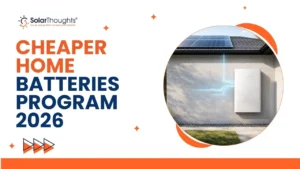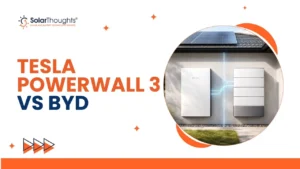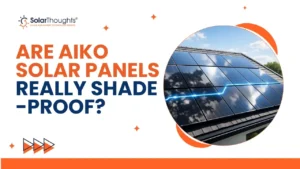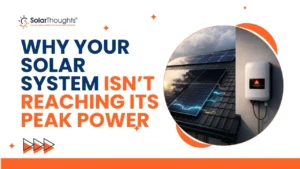With electricity bills climbing and solar rebates still available, 2025 is the perfect time to go solar in Brisbane and the Gold Coast. But before making the switch, there’s one critical choice that could make or break your solar investment — choosing the right solar panel brand.
Table of Contents
ToggleTrina and LONGi are two of the most trusted solar brands in Australia, each known for high efficiency, strong warranties, and reliable long-term performance. But which one actually delivers better results on Brisbane rooftops?
Keep reading to discover which solar panel suits your needs and how to make the smartest choice for your home.

Brand Overview & Market Presence
| Feature | Trina Solar | LONGi Solar |
|---|---|---|
| Founded | 1997 (Changzhou, China) | 2000 (Xi’an, China) |
| 2025 Revenue | $10.59 billion USD | $12.3 billion USD |
| Global Reach | 170+ countries | 150+ countries |
| Expected Shipments | 70–75GW | 80–90GW |
| Australia Presence | One of Australia’s most installed brands | Popular in large-scale and premium installs |
Trina Solar continues to be a favourite for Aussie residential installations, regularly ranked #1 for value by solar retailers and installers.
LONGi, while more common in commercial-scale systems, has become a go-to for tech-savvy homeowners chasing maximum efficiency.
Panel Efficiency & Output
| Feature | Trina Solar | LONGi Solar |
|---|---|---|
| Max Efficiency | 25.44% (HJT) | Up to 26% (Back Contact) |
| Common Efficiency | ~22.3% (Vertex S+) | Up to 24.8% (Hi-MO X10) |
| Power Range | 420–445W | 415–440W (Hi-MO 5m), up to 700W |
| Tech | TOPCon, HJT | HIBC, Back-Contact, Tandem Perovskite |
LONGi holds the world record for commercial module efficiency in 2025, reaching up to 26% with their high-end modules. Trina’s HJT tech trails closely, achieving 25.44%.
That said, both brands offer high-efficiency panels well above industry averages, making them ideal for Australian homes with limited roof space.
Durability & Weather Resistance
| Specification | Trina Solar | LONGi Solar |
|---|---|---|
| Front Load | 5400 Pa | 5400 Pa |
| Rear Load | 4000 Pa | 2400 Pa |
| Junction Box | IP68 (Fully submersible) | IP67 (Water resistant) |
| Salt Mist & Ammonia Resistance | Yes (Certified) | Yes (Certified) |
| Certifications | IEC, ISO, UL, PVEL Top Performer | IEC, ISO, PVEL Performer |
In Australia’s coastal, dusty, and storm-prone environments, Trina’s IP68 junction boxes and stronger rear load rating (4000Pa) make them especially well-suited.
LONGi’s tech is impressive but slightly less robust when it comes to extreme wind zones or cyclonic regions in QLD and NT.
Performance in Real-World Heat
| Feature | Trina | LONGi |
|---|---|---|
| Temperature Coefficient | ~-0.30%/°C | As low as -0.24%/°C (HIBC) |
| Annual Degradation | 0.4% | 0.45–0.55% |
| Output After 30 Years | ≥87.4% | ~84–85% |
Australian rooftops often exceed 40°C in summer. LONGi’s newer panels have the edge with lower heat loss rates, but Trina’s slower degradation rate means it retains more power output over time.
In Brisbane, heat tolerance matters and both brands deliver top-tier performance.
Warranty & Long-Term Support
| Warranty Type | Trina Solar (Vertex S+) | LONGi Solar (Hi-MO 5m) |
|---|---|---|
| Product Warranty | 25 years | 25 years (previously 15) |
| Performance Warranty | 30 years | 25–30 years depending on model |
| Power Output Guarantee | ≥87.4% (30 yrs) | ~84% (25 yrs) |
Trina offers a more robust long-term performance guarantee, with many Australian installers preferring it for its clearer linear warranty structure and performance over 30 years.
Value for Aussie Households
- Trina panels are more often seen in residential installations, thanks to their affordability, ruggedness, and excellent installer support.
- LONGi is gaining traction for tech-forward homes or commercial setups, especially where roof space is limited and output needs to be maximised.
Which Is Better for Australia in 2025?
Choose LONGi if you want:
- Record-breaking efficiency (up to 26%)
- Space-saving high-output modules
- The latest tech like back-contact or HIBC
Choose Trina if you value:
- Rugged durability and weather protection
- Slower panel degradation for long-term energy savings
- Superior rear load and waterproofing (IP68)
Both brands are Tier 1, AAA-rated, and approved for use across all Australian states and territories. Your final choice should depend on your location, budget, and priorities—efficiency vs durability, upfront cost vs long-term value.
Need Help Choosing?
If you’re based in the Gold Coast, Brisbane, or Sunshine, SolarThoughts® can help you install a solar system tailored to your home. We offer FREE expert quotes, installation by Clean Energy Council (CEC) accredited professionals, and only the top Tier 1 panels.
📞 Call 1300 846 844
📍 Suite 4.50, Level 4 South Tower, 339 Coronation Drive, Milton
🌐 www.solarthoughts.com.au
FAQs
Q1: Is LONGi better than Trina for hot Australian climates?
Both are heat-tested, but LONGi’s advanced panels lose slightly less efficiency in high temperatures.
Q2: Do both panels meet Australian standards?
Yes. Both are CEC-listed and meet IEC and ISO standards. Trina offers additional certifications ideal for coastal and harsh regions.
Q3: What happens after 25 years of use?
Trina guarantees ≥87.4% output at 30 years. LONGi offers ~84% at 25 years. Both brands outperform industry minimums.
Q4: Which solar panel is best value for money in Australia?
Trina typically offers better dollar-per-watt value for Aussie homes, especially for those in rural or extreme weather regions.






